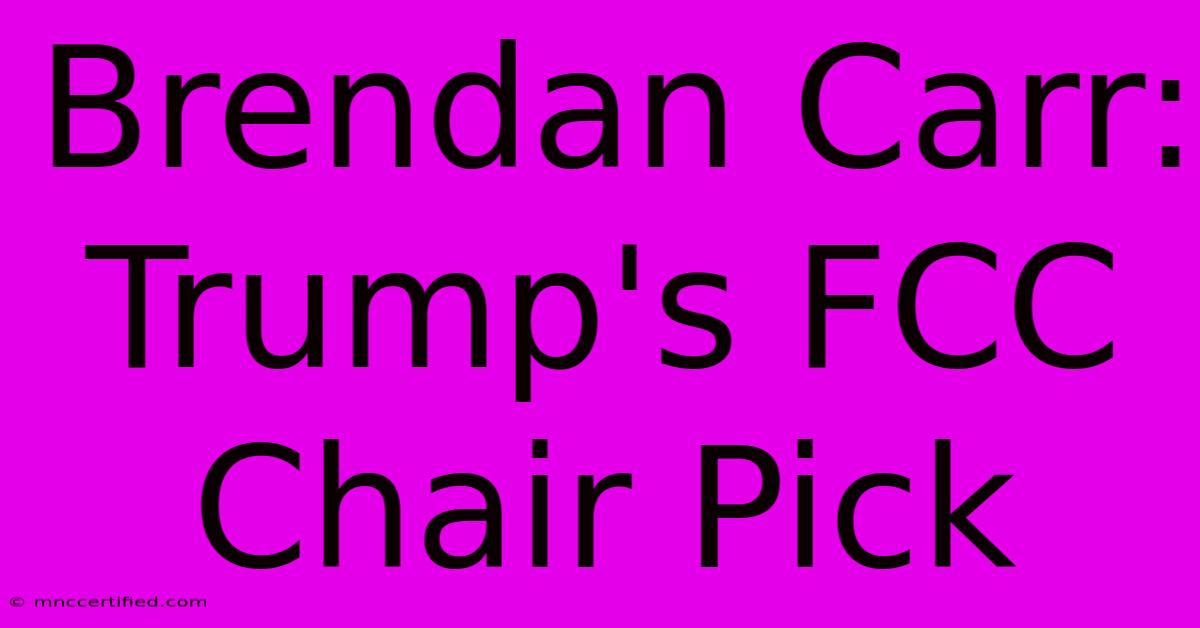Brendan Carr: Trump's FCC Chair Pick

Table of Contents
Brendan Carr: Trump's FCC Chair Pick – A Deep Dive into His Tenure and Legacy
Brendan Carr's appointment as an FCC Commissioner under the Trump administration sparked considerable debate and continues to be a topic of discussion. This article delves into his background, key policy decisions, and the lasting impact of his tenure. We'll explore his stance on net neutrality, media ownership, and the role of technology in society, analyzing both praise and criticism surrounding his time in office.
From Lawyer to Commissioner: Brendan Carr's Background
Before joining the Federal Communications Commission (FCC), Brendan Carr honed his skills as a lawyer, specializing in telecommunications and technology law. This background significantly shaped his approach to regulatory issues during his time as a commissioner. His legal expertise allowed him to navigate complex legislative landscapes and contribute to the shaping of significant FCC policies. Understanding his background is crucial to understanding the motivations behind his actions.
Key Policy Positions and Decisions
Carr's tenure at the FCC was marked by several pivotal decisions that sparked heated public discourse. Some of his most notable contributions include:
-
Net Neutrality: Carr was a vocal opponent of net neutrality rules, advocating for a lighter regulatory touch on internet service providers. This stance aligned him with the broader Republican approach to deregulation, and his votes played a critical role in the FCC's 2017 decision to repeal the Obama-era net neutrality regulations. This remains one of the most controversial aspects of his legacy.
-
Media Ownership: Carr’s views on media ownership often reflected a desire for deregulation, advocating for policies that could lead to increased consolidation within the media industry. This position drew criticism from those concerned about the impact on media diversity and local news.
-
5G Deployment: Conversely, Carr actively supported policies aimed at accelerating the deployment of 5G wireless technology. He believed that fostering competition and innovation in this sector was essential for US economic competitiveness. This proactive approach aligns with a general focus on technological advancement and modernization.
-
Combating Foreign Influence: In recent years, Carr's focus shifted towards addressing concerns about the influence of foreign governments on US telecommunications infrastructure and technology. He spearheaded efforts to investigate companies with alleged ties to the Chinese government, raising significant national security concerns. This marked a change in focus, demonstrating a response to evolving geopolitical considerations.
Analyzing the Criticism and Accolades
Brendan Carr's time as an FCC commissioner wasn't without its critics. His stance on net neutrality, in particular, drew fierce opposition from consumer advocacy groups and internet freedom activists. They argued that his policies favored large corporations at the expense of consumers and online innovation.
However, Carr also received praise from certain quarters. Supporters lauded his focus on deregulation, arguing that it promoted competition and economic growth. His efforts to advance 5G technology also garnered positive attention, highlighting the potential for technological advancement.
The Lasting Impact and Legacy
Brendan Carr's legacy is complex and multifaceted. His decisions continue to shape the telecommunications landscape, sparking ongoing debate about the appropriate role of government regulation in the digital age. His strong opinions and decisive votes played a key role in reshaping FCC policy during a period of rapid technological change. Whether his legacy will ultimately be viewed positively or negatively remains to be seen and will depend largely on the future evolution of the telecommunications sector and the long-term effects of his policies.
SEO Keywords Used:
- Brendan Carr
- FCC Commissioner
- Trump Administration
- Net Neutrality
- Media Ownership
- 5G Deployment
- Telecommunications
- Technology Law
- Deregulation
- Republican Party
- Obama-era Net Neutrality
This article incorporates a variety of SEO strategies, including:
- Keyword Optimization: Strategic placement of relevant keywords throughout the text.
- Header Structure: Clear and concise headers using H2 and H3 tags to improve readability and SEO.
- Bold Text: Emphasis on key terms and concepts for enhanced readability and SEO.
- Comprehensive Content: In-depth coverage of the topic to provide valuable information to readers and search engines.
- Natural Language: Avoids keyword stuffing while maintaining good keyword density.
This approach aims to attract organic traffic from Google searches related to Brendan Carr and his tenure at the FCC. Remember to build backlinks to further boost your SEO performance.

Thank you for visiting our website wich cover about Brendan Carr: Trump's FCC Chair Pick. We hope the information provided has been useful to you. Feel free to contact us if you have any questions or need further assistance. See you next time and dont miss to bookmark.
Featured Posts
-
Street Style And Luxury Travis Kelces Look
Nov 19, 2024
-
Supermicro Stock Extends Gains Delisting Averted
Nov 19, 2024
-
Buffalo Bills Fan Gift Guide
Nov 19, 2024
-
Jennifer Lawrence Pregnant Baby Bump
Nov 19, 2024
-
Kerr And Mewis Announce Pregnancy
Nov 19, 2024